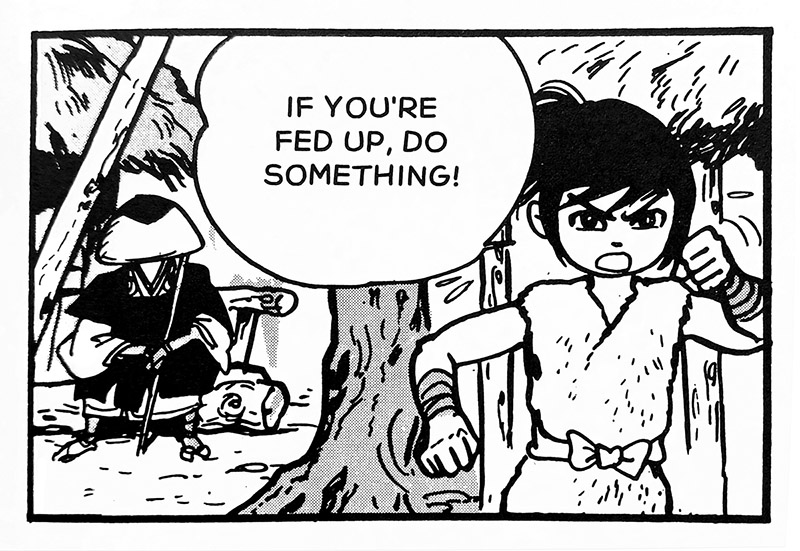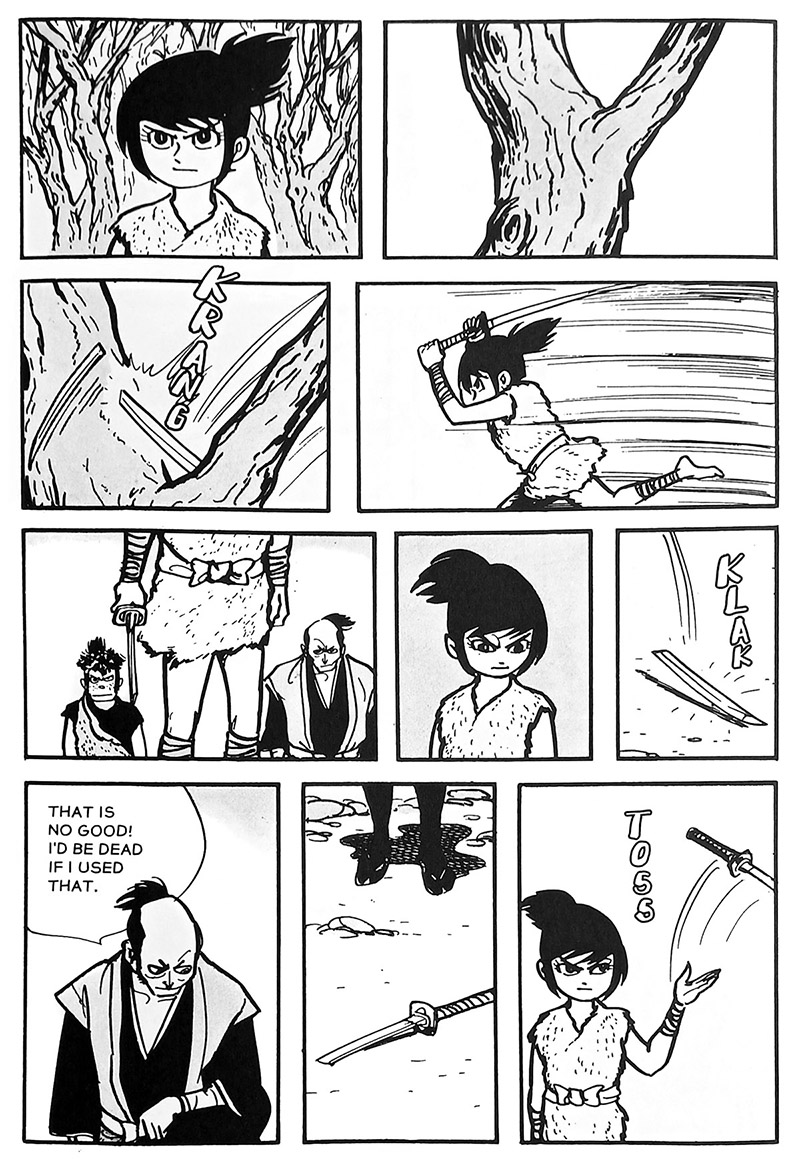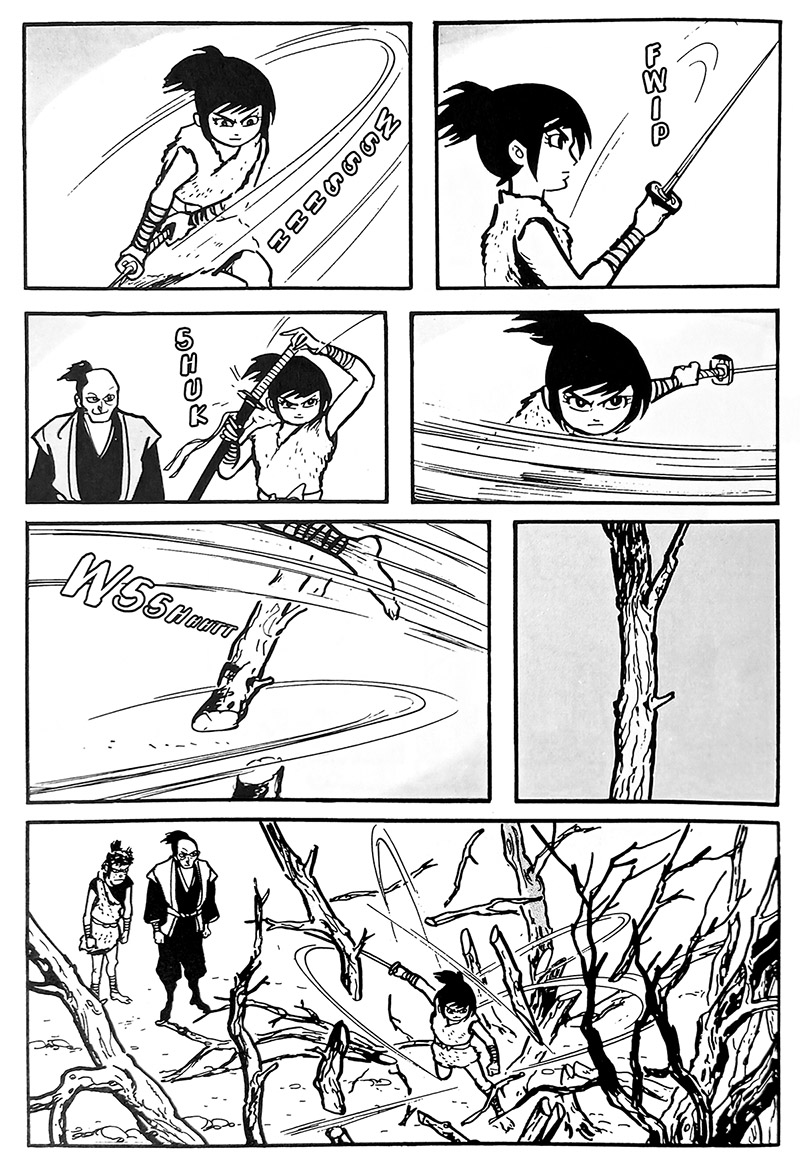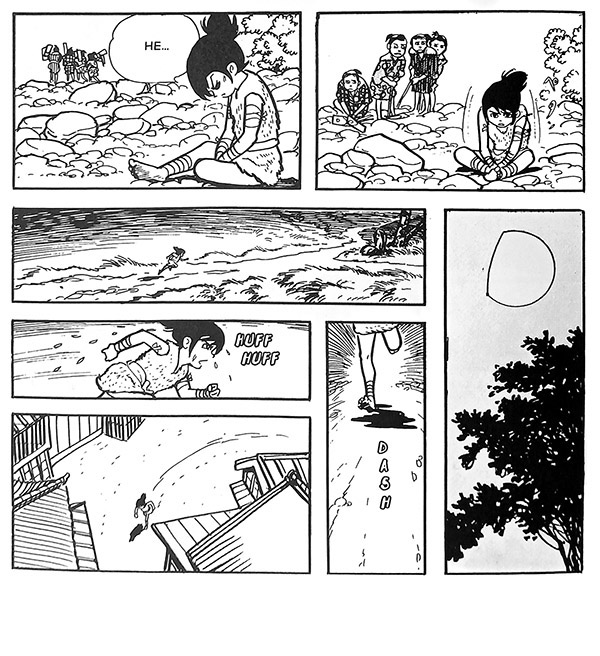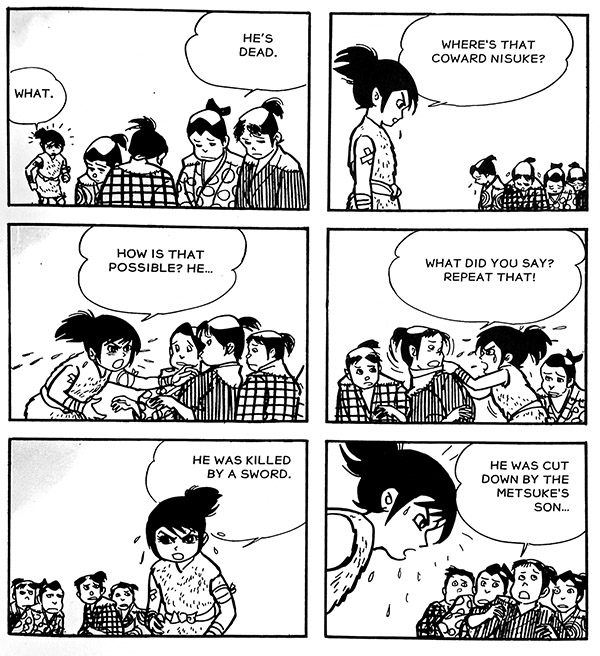-
Slaps or karate chops 6‒7 people in the head or neck (unclear); some of them other children and at least one adult who was already weeping.
-
Repeatedly calls all of his family and neighbors fools and cowards and chastizes them for begging for food while they are starving and homeless because their whole village burned down.
-
Trips a girl in response to her tickling him.
-
Beats up a lot of other kids (mostly bullies).
-
Makes a bully eat [redacted].
-
Spontaneously cuts off a girl’s hand in response to her plea to be punished instead of her father.
-
Kidnaps aforementioned man anyway and ties him up hanging from a high branch in a lone tree.
-
Stabs and cuts his own hand almost in half between the metacarpals to make a point.
-
Taunts and fights ten or more feral dogs for fun.
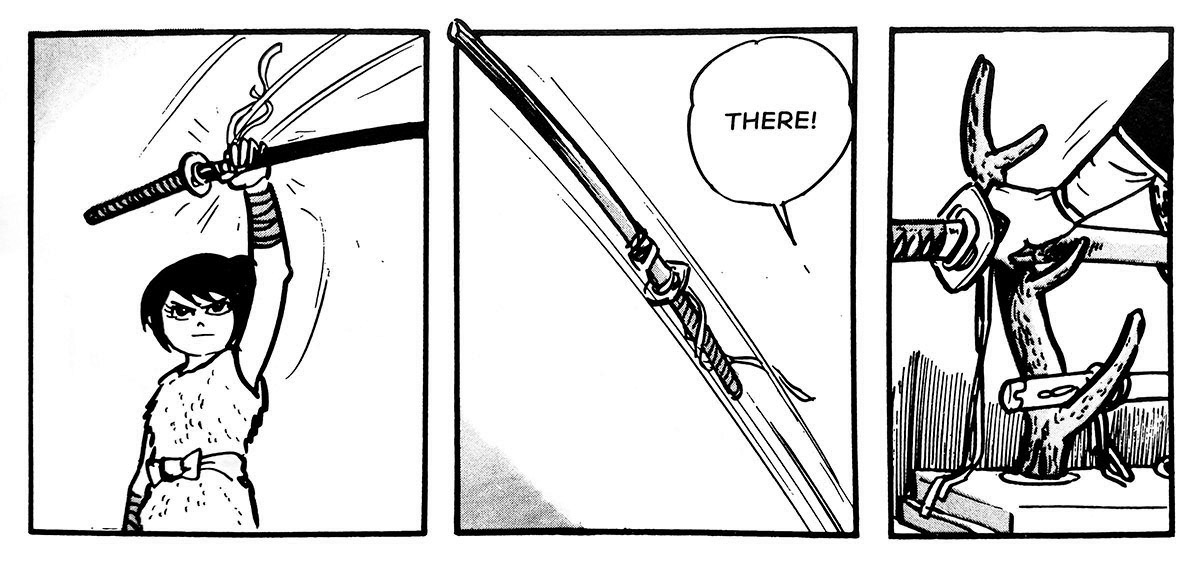
SWORDS BROKEN
Rage and Repression in Shirato Sanpei’s Kamui
“Living in feudal society is like trying to wash your body, your clothing in filthy water. It doesn’t work. Everyone knows this, even if they can’t admit it.”
July 5th, 2025
Last night, I finished reading Sanpei Shirato’s The Legend of Kamui, Vol. I, as titled and published in English by Drawn & Quarterly (tr. Richard Rubinger with Noriko Rubinger, add. tr. Alexa Frank). It’s kind of nuts. I’ll now embark on the dubious endeavor of trying to express what I got from this story without outright restating the author’s entire conclusion.
Sanpei Shirato was the son of the lefty avant-garde artist and influential cultural theorist Tarō Okamoto, who sounds pretty chill, and who provided for Shirato, let’s say, an interesting childhood during Japan’s fascist period―Shirato was born in 1932, which makes him a contemporary in time and space of my grandmother. This is amusing to me for reasons I won’t get into. Anyway, after the war, by the late 1950s, he had grown into an intensely skilled mangaka and was becoming a countercultural icon, and soon he was a well known Marxist social critic and editor of a popular magazine to boot. In Shigeru Mizuki’s Showa history manga, he’s presented as a sort of rockstar; when he shows up, barefoot and looking like a pirate, he seems to be the only one among their gaggle of artists who’s making any money. He’s “loaded,” in fact, according to the perpetually broke Mizuki, and he takes them all out for spaghetti. Here are the relevant pages [1], [2], [3] ...I started reading Kamui almost entirely on the basis of that panel where he says “I want... spaghetti” and the next panel of everyone eating spaghetti.
But we’re not here to talk about spaghetti. We’re here to talk about a sword-crazed tween.
Above: Kamui going absolutely ham on a bunch of dead trees with a sword. I’m putting this here now so you don’t get bored. PS: don’t forget to read right-to-left, kids.
Above: Earlier, Kamui learns of the death of his frenemy/sparring partner, Nisuke.
I described Kamui to my partner as “like Link from Zelda if Link was a tryhard moralist-absolutist Marxist insurrectionary,” or something like that. Having slept on it, I have to wonder if Shirato was a very early, perhaps formative creator of the “warrior child” character type. (Tezuka’s decade-earlier Astro Boy also comes to mind, of course, but I’m talking sword-children here.) I raise this question because Kamui being a child works on a very specific level.
What Shirato does with this story, before the boy Kamui even exists, is spend hundreds of pages lovingly depicting animal life, the hardships and dysfunctions of wolves in particular, in parallel with an elaborate exploration of the cruelty of feudalism. We watch people making unconscionable sacrifices to survive: burying their dignity to stay out of trouble with their overlords, getting swindled as a matter of de facto law, forcing themselves to bear it beyond physical limits, going mad, starving, and turning on each other as a matter of class in particular. Occasionally, as a larger group, they manage to push back.
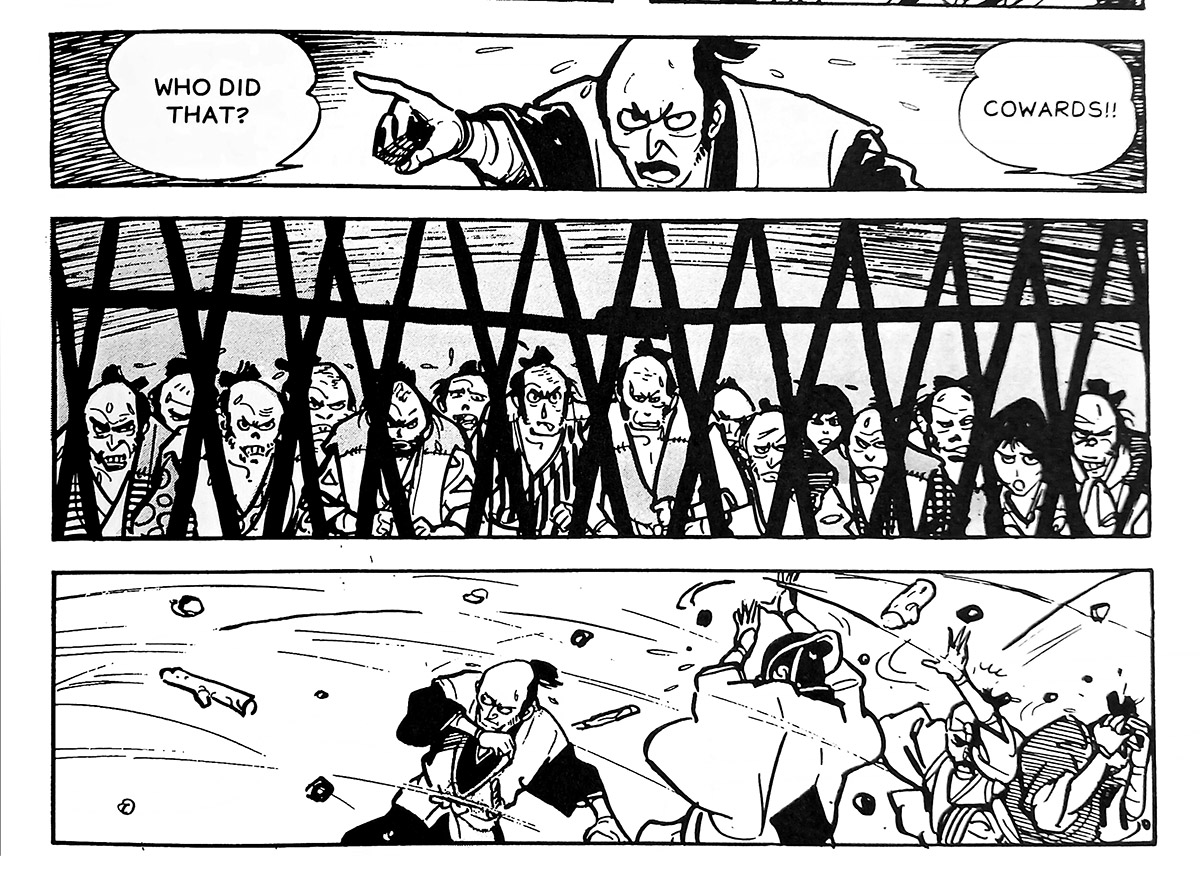
Above: A scene of rebellion at a public execution.
It’s all fairly hideous and heart-wrenching and it resonates. And then there’s this weird, mean little animal child... He kind of sucks sometimes, but you can’t blame him. It took me a while to figure this out, but I think basically the story is set up to overwhelmingly show us “the world is like this” and then uses the quintessential “Why?” of a child who won’t stop questioning the rules, the stubborn “No,” no, no, as a foil for the other commoners, and for us, forcing everyone to acknowledge the wall between us and freedom. They keep explaining how the world works, and it’s obviously indefensible, and Kamui says so. He utterly rejects their complacence to injustice. People repeatedly tell him to stop fighting back, stop escalating, stop making things worse. Kamui refuses. He keeps telling them they’re cowards and fools. Yokome, the guy in the scenes pictured above, observes that “sadly, that type doesn’t live long.”
Kamui doesn’t care. He refuses Yokome’s offer of training under him to become a petty lord of the underclasses, breaks the guy’s piece of shit sword on a tree within seconds of it being handed to him, and walks away. It gets to a point where a mob of villagers are literally holding him down on the ground, frantically pleading, and they still can’t stop him. He goes and does something crazy.
I’d like to end with an optional list of all the extreme and frequently indefensible things perpetrated by this very very strong and violent twelve-year-old(?). If you’d care to read that, here it is:
Kamui is obsessed with swords, but only as a tool; power, but only as a hypocrisy; and becoming strong, but only as a means to an end. He’s looking straight past it all; He goes somewhere we sort of all wish we could, in a manner of speaking. I won’t spoil the end of this story, because it’s cool as hell, and tragically too much to get into here.
